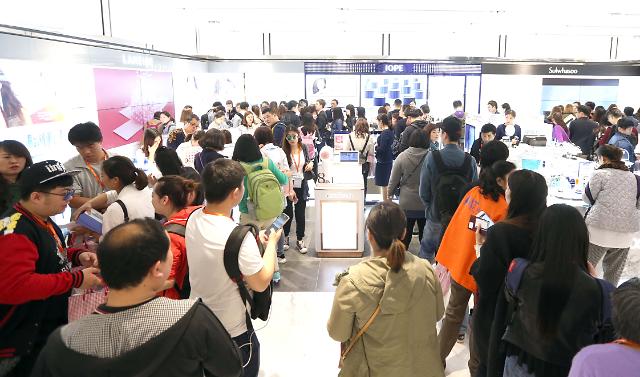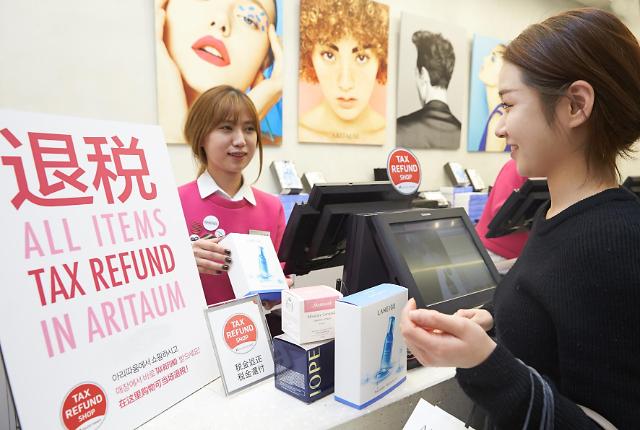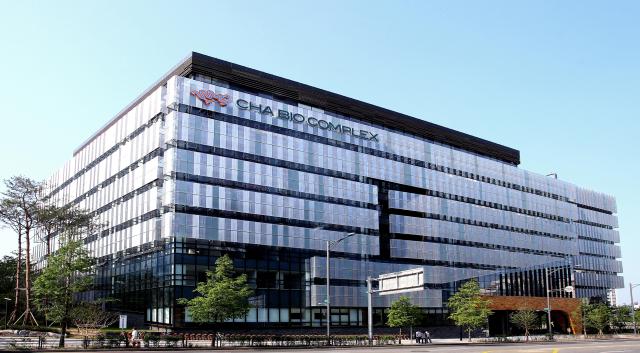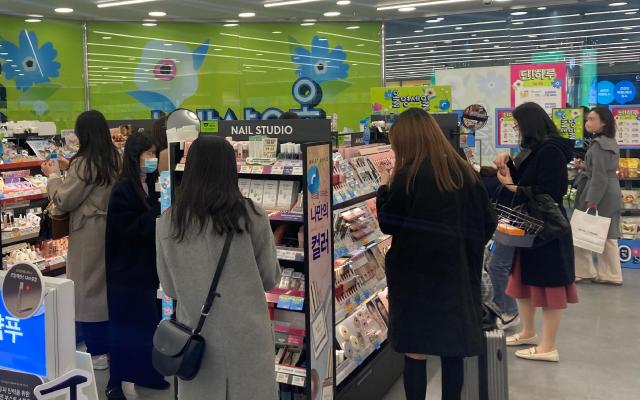
A duty-free cosmetics store at the Shinsegae Centum City Department Store in Busan is crowded with Chinese tourists.[Yonhap News Photo]
[FOCUS: South Korea's booming cosmetics industry led by AmorePacific.]
South Korean cosmetics giant AmorePacific has been one of the biggest beneficiaries from the rising popularity of Korean dramas and pop culture, making a stellar performance especially in China and other Asian countries.
AmorePacific tapped into the overseas market in 1964 and managed to set up modest production bases in China and France in the early 1990s. Sales have seen a dramatic increase in the past five years, buoyed by South Korea's pop culture wave "Hallyu". Brand shops are almost in every big city in Asia, and its profit jumped 52 percent on-year to 585 billion won (515 million US dollars) last year.
With its market cap now standing at 23 trillion won, AmorePacific joined the top 10 stocks in the Korean Exchange by market capitalization at the end of last year.
Its growth, however, was not finished, as AmorePacific chief Suh Kyung-bae sees greater sales in China thanks to its rising middle-class consumers and in other regions.
For his global business strategy, Suh has unveiled his trademark "seven pillars" theory to expand beyond five regions, including China, Southeast Asia, Japan, North America and Western Europe, into India and South America.
His strategy was off to a good start in April when AmorePacific opened its global online shopping site which allows clients to purchase products in the currencies of 27 countries and receive a direct delivery service. The company's old shopping websites have only accepted the greenback. Starting this year, it promised to accelerate its business expansion abroad.
Cosmetics products were the most popular item for on-line exports, with their sales rising 16 percent on-year in 2015, according to data from eBay Korea, an e-commerce company.
With diversified product lines to satisfy customers with different skin conditions, culture, and style, AmorePacific is now at the forefront of rapid growth by South Korea's cosmetics industry which has threatened to replace traditional powerhouses such as shipbuilding as a new growth engine for exports.
Prospects for South Korea's overall exports are bleak, but Suh was optimistic, saying the company would expand total sales from 4.7 trillion won last year to 12 trillion by 2020 while overseas sales, which stood at 1.26 trillion won last year, will account for 50 percent of the company's total sales over the same period.

An AmorePacific shop offers tax refunds for foreign customers [Courtesy of AmorePacific]
Hallyu sparked the tremendous popularity of South Korean cosmetics in Asia. Their shipments have more than tripled in the past five years to hit a record high of $2.45 billion last year, posting an annual average growth of 36.9 percent, according to the Korea Customs Service. In 2015, South Korean cosmetics exports to China reached $999.5 million.
Suh counts on the growing market in China, saying its non-tariff barrier will not be a hurdle as it is designed mainly to curb copycats. "China's tightened retail regulations will have a limited impact on companies that have already established distribution channels there," he said, pointing to AmorePacific's brand power.
Meritz Securities predicted that AmorePacific's sales would grow more than 30 percent this year. "Despite a drop in the inflow of Chinese tourists, sales of cosmetics products at duty-free shops are increasing. The trend of favoring Sulwhasoo and other luxury brands is clear among the Chinese," Meritz analyst Yang Ji-hye said in a research paper.
At home, AmorePacific also maintained an aggressive business strategy, opening the flagship store of Sulwhasoo in March following the brand's record sales. The four-story building in Seoul's affluent Gangnam district is South Korea's largest beauty store for a single cosmetics brand. The company regards the store as a new stepping stone for its ambitious drive to become Asia's top brand.
Launched in 1997, Sulwhasoo has been popular at home and across Asia, with its annual sales hitting a record high of one trillion won last year. The product uses ingredients extracted from oriental herbs, appealing to Chinese customers.
This year Suh targets the Middle East, selecting Dubai as a regional base. Market watchers, however, are watching how he can overcome strict halal standards. Halal cosmetics must not contain alcohol, blood and any parts or substances of forbidden animals like pigs.
Samsung Securities said South Korean cosmetics companies would show a good performance this year, probably better than their heydays in 2004 thanks to brisk sales abroad.
Aju News Lim Chang-won = cwlim34@ajunews.com




